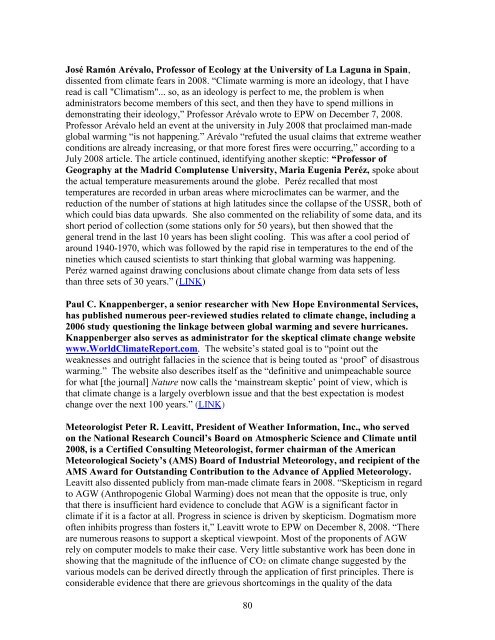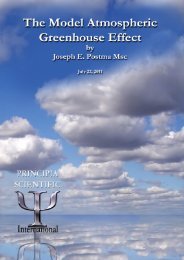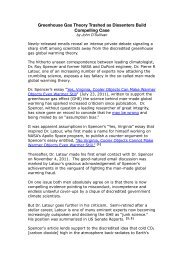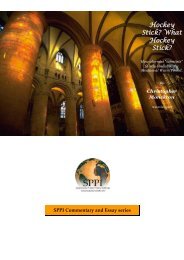Than 1000 International Scientists Dissent Over Man-Made Global ...
Than 1000 International Scientists Dissent Over Man-Made Global ...
Than 1000 International Scientists Dissent Over Man-Made Global ...
You also want an ePaper? Increase the reach of your titles
YUMPU automatically turns print PDFs into web optimized ePapers that Google loves.
José Ramón Arévalo, Professor of Ecology at the University of La Laguna in Spain,<br />
dissented from climate fears in 2008. ―Climate warming is more an ideology, that I have<br />
read is call "Climatism"... so, as an ideology is perfect to me, the problem is when<br />
administrators become members of this sect, and then they have to spend millions in<br />
demonstrating their ideology,‖ Professor Arévalo wrote to EPW on December 7, 2008.<br />
Professor Arévalo held an event at the university in July 2008 that proclaimed man-made<br />
global warming ―is not happening.‖ Arévalo ―refuted the usual claims that extreme weather<br />
conditions are already increasing, or that more forest fires were occurring,‖ according to a<br />
July 2008 article. The article continued, identifying another skeptic: “Professor of<br />
Geography at the Madrid Complutense University, Maria Eugenia Peréz, spoke about<br />
the actual temperature measurements around the globe. Peréz recalled that most<br />
temperatures are recorded in urban areas where microclimates can be warmer, and the<br />
reduction of the number of stations at high latitudes since the collapse of the USSR, both of<br />
which could bias data upwards. She also commented on the reliability of some data, and its<br />
short period of collection (some stations only for 50 years), but then showed that the<br />
general trend in the last 10 years has been slight cooling. This was after a cool period of<br />
around 1940-1970, which was followed by the rapid rise in temperatures to the end of the<br />
nineties which caused scientists to start thinking that global warming was happening.<br />
Peréz warned against drawing conclusions about climate change from data sets of less<br />
than three sets of 30 years.‖ (LINK)<br />
Paul C. Knappenberger, a senior researcher with New Hope Environmental Services,<br />
has published numerous peer-reviewed studies related to climate change, including a<br />
2006 study questioning the linkage between global warming and severe hurricanes.<br />
Knappenberger also serves as administrator for the skeptical climate change website<br />
www.WorldClimateReport.com. The website‘s stated goal is to ―point out the<br />
weaknesses and outright fallacies in the science that is being touted as ‗proof‘ of disastrous<br />
warming.‖ The website also describes itself as the ―definitive and unimpeachable source<br />
for what [the journal] Nature now calls the ‗mainstream skeptic‘ point of view, which is<br />
that climate change is a largely overblown issue and that the best expectation is modest<br />
change over the next 100 years.‖ (LINK)<br />
Meteorologist Peter R. Leavitt, President of Weather Information, Inc., who served<br />
on the National Research Council‟s Board on Atmospheric Science and Climate until<br />
2008, is a Certified Consulting Meteorologist, former chairman of the American<br />
Meteorological Society‟s (AMS) Board of Industrial Meteorology, and recipient of the<br />
AMS Award for Outstanding Contribution to the Advance of Applied Meteorology.<br />
Leavitt also dissented publicly from man-made climate fears in 2008. ―Skepticism in regard<br />
to AGW (Anthropogenic <strong>Global</strong> Warming) does not mean that the opposite is true, only<br />
that there is insufficient hard evidence to conclude that AGW is a significant factor in<br />
climate if it is a factor at all. Progress in science is driven by skepticism. Dogmatism more<br />
often inhibits progress than fosters it,‖ Leavitt wrote to EPW on December 8, 2008. ―There<br />
are numerous reasons to support a skeptical viewpoint. Most of the proponents of AGW<br />
rely on computer models to make their case. Very little substantive work has been done in<br />
showing that the magnitude of the influence of CO2 on climate change suggested by the<br />
various models can be derived directly through the application of first principles. There is<br />
considerable evidence that there are grievous shortcomings in the quality of the data<br />
80





